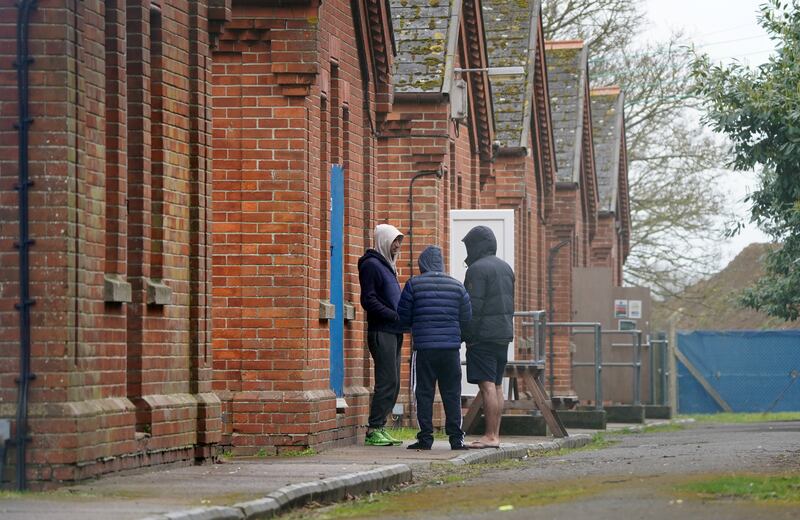Iraqi and Iranian asylum seekers in the UK are facing increased uncertainty over their future after the Home Office announced a new fast-track scheme for their applications.
Claimants from the two countries will be sent a lengthy questionnaire to complete before being invited to “shorter, more focused interviews” with officials.
Only those who lodged their claims before June 2022 will be eligible to fill out the forms, which will give them an opportunity to explain why they believe they need protection status in the UK.
The documents must be filled out in English.
The scheme is seen as an attempt by the government department to clear the backlog of 92,601 asylum cases submitted before last summer by the end of the year.
Lawyers poured cold water on the new asylum programme, and criticised Rishi Sunak’s government and previous Conservative administrations over their handling of the backlog.
Asylum seekers ‘in a frenzy’
Qays Sediqi, head of public law at Barnes Harrild & Dyer solicitors in London, dismissed the fast-track initiative as a “means for the Home Office to show they are doing something” to tackling the asylum backlog.
Iraqi and Iranian asylum seekers make up 77 per cent of the firm’s clients and the announcement has left them fearing for their futures.
The number of Iranian asylum cases in the legacy backlog at the end of 2022 was 11,698 and there were 8,909 from Iraqis.
These 20,607 cases accounted for about 15 per cent of the overall number in the legacy category.
Mr Sediqi told The National: “It came out of the blue so it has caused a frenzy.
“My clients are extremely worried because they don’t know what this will mean for them. Some believe that it may lead to a massive refusal of cases.
“All Iraqi and Iranian cases are quite complicated.”

'Home Office in deep waters'
The grant rate for Iranian claimants is 80 per cent, while for Iraqis it is 54 per cent.
Mr Sediqi lacriticised mbasted the Home Office for not processing asylum applications in a timely manner.
A similar fast-track scheme was unveiled in February, asking asylum seekers from Syria, Afghanistan, Libya, Yemen and Ethiopia to fill out documents or risk having their claims rejected.
The solicitor said he helped his clients complete their forms but more than two months later no one has received a decision from the Home Office.
“It’s absolutely appalling the way the Home Office has been dealing with asylum seekers,” he said.
“They are trying to find small pockets [of applicants] to show that they are doing something about the backlog.
“They are deep waters. This new scheme is a pathetic attempt.
“I take what the Home Office says with a pinch of salt. I don’t have very high hopes.”
A Home Office spokesperson said: “We need to make sure asylum seekers do not spend months or years living in the UK, at vast expense to the taxpayer, waiting for a decision.
“This questionnaire will help us clear the backlog of historic asylum cases by speeding up decisions and allowing case workers to carry out shorter, more focused interviews.
“Individuals who receive one, like all asylum seekers, are subject to mandatory security checks against their claimed identity including immigration and criminality checks on UK databases, which is critical to the delivery of a safe and secure immigration system.”
Mr Sediqi, a former Afghan refugee who obtained EU citizenship before moving to the UK, deals with a large number of Iraqi men who fled their homeland after becoming embroiled in “blood feuds”.
“These usually relate to families who are well connected and influential so it is not safe for them to internally relocate,” he said.
In April, a trainee pharmacist from Iraq told The National about his frustration at being left to languish in government-sponsored accommodation in the UK for months while awaiting the outcome of his asylum application.
The prime minister is under intense pressure from Conservative MPs and party members to stamp out illegal immigration.
Mr Sunak and Home Secretary Suella Braverman have vowed to push ahead with a controversial policy to send asylum seekers to Rwanda while their applications are being processed.
Last June, two of Mr Sediqi’s Iranian clients were on board the first scheduled deportation flight that ended up being thwarted at the last minute by a court injunction.
Almost a year on, he said the men are still suffering the “mental repercussions” of Britain’s failed attempt to deport them.
“You can imagine the emotional toll it had on them,” he said.







